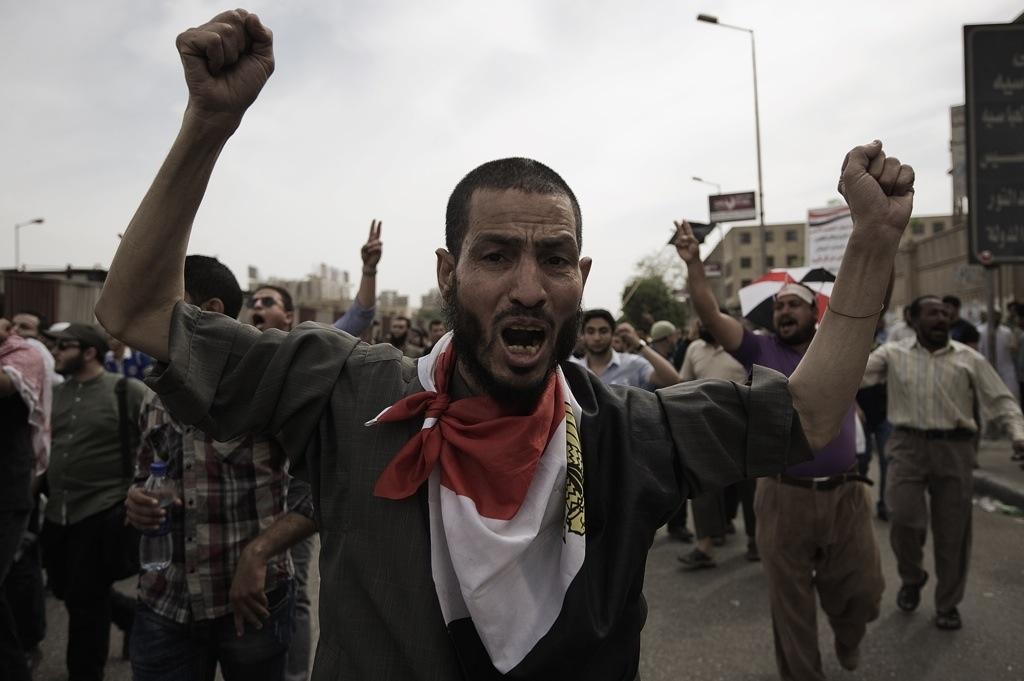Egypt’s transition is ending the way it began — in protest
Egyptian protesters shout slogans at soldiers outside the defense ministry on May 4, 2012 in Cairo.
CAIRO, Egypt — Renewed clashes between protesters and army soldiers at the defense ministry in Cairo on Friday deepened Egypt's political crisis just weeks ahead of the country's crucial presidential elections.
While frustrations with the ruling military ran high among protesters, it also ran high among Cairo residents who said they saw little purpose for such sustained demonstrations.
Egypt’s ruling generals, known as the Supreme Council of Armed Forces, said they would arrest those responsible for inciting Friday’s mass demonstration, which led to the death of one soldier.
Nearly 400 were also injured when thousands of protesters of all stripes converged on the ministry in the afternoon. The protest followed a week of deadly street battles between supporters of the disqualified candidate and popular fundamentalist cleric Hazem Saleh Abu Ismail and plainclothes assailants.
“When the people are getting killed, we are all Egyptians,”said Mohamed Abdul Hadi, a young member of the Revolutionary Socialists, who joined the ministry protest.
More from GlobalPost: Thousands demonstrate in Cairo
It was unclear who launched the first salvo — the protesters or the military — at the tangles of barbed wire outside the ministry's gates.
But using water cannons, rocks, tear gas and batons, the army managed to flush out thousands of protesters from the Abbaseya neighborhood of Cairo and into the surrounding streets.
Some reports said the dead soldier was shot in the stomach, but it is highly unusual for activists to carry guns. General Mokhtar Al Mullah imposed an eight-hour overnight curfew following the clash.
The fresh round of violence cast a shadow over what should be the country’s first free presidential elections in decades on May 24. A popular uprising toppled former Egyptian President Hosni Mubarak last year.
The military seized power during the revolt, but has since fallen afoul of the revolutionaries that had initially welcomed the army’s support against Mubarak.
The military has since adopted many of Mubarak's strategies, violently suppressing protests, throwing activists into military prison and painting them as foreign-paid thugs.
Protesters and others have long worried that the military, which said it would handover power after the election, secretly wants to maintain control of the government.
More from GlobalPost: For Egypt, gas deal with Israel was bad for business
“We are coming here today to send a message to the army,”said Ibrahim Saleem, a member of parliament for the Muslim Brotherhood’s Freedom and Justice Party, in Cairo’s iconic Tahrir Square on Friday.“The end of your rule is June 30,”the date the military originally set for a transfer of power.
The Brotherhood lawmakers said they would not march to the defense ministry, despite what they said was the complicity of the military-run government for the deaths that occurred earlier in the week.
Later, they denied involvement in the demonstration at the ministry. Muslim Brotherhood officials condemned both sides for the violence, reports said.
The battle at Abbaseya saw heightened bravado on the part of the protesters — both Islamist and secular — who sought to take their demands to the doorstep of Egypt’s notoriously powerful and shadowy military.
“If there was a peaceful way to get our rights, we would do it,”said Sharif Mohammed, a 39-year-old IT engineer at the protest.
More from GlobalPost: Egypt's next revolution could be over water
But while anger at military's mismanaged transition was palpable at the demonstration, frustration toward the protesters at times ran just as high.
Residents of Abbaseya are said to have helped the army round-up protesters they accused of sowing chaos in their neighborhood. Locals were seen shaking their heads in disapproval as protesters spilled onto the dusty streets.
“The whole thing doesn’t really have a purpose,”said Hisham Kassem, a longtime opposition activist under Mubarak and co-founder of Egypt’s first independent daily newspaper, Al-Masry Al-Youm.
“It was claimed it was to pressure the army into transferring power to a civilian authority. If the army were to indicate they won’t transfer power, I would go into the streets and protest myself. But on June 30, there will be a civilian authority in power. There’s no need to pressure the army.”
Every day, reporters and producers at The World are hard at work bringing you human-centered news from across the globe. But we can’t do it without you. We need your support to ensure we can continue this work for another year.
Make a gift today, and you’ll help us unlock a matching gift of $67,000!
